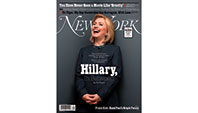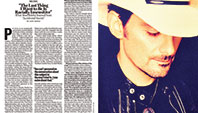
1. In her first interview since stepping down as secretary of State, Hillary Clinton tiptoed around questions about a presidential run in 2016, though of course her delicate answers didn’t stop readers from speculating (“Hillary in Midair,” by Joe Hagan, September 23). “If you thought you’d get an answer, well, you ought to know better,” wrote Lexi Nisita at Refinery 29. “She’s clearly being very careful to walk the line before making a decision.” “When asked about her political aspirations, Hillary is a typical politician, managing to string together a lot of words which, combined together in sentence form, could be interpreted to mean 5,930 different things,” observed Joshua Shnayer at the American Spectator. “It did highlight something odd,” wrote Isaac Chotiner at The New Republic. “Namely, that the impetus behind a Clinton candidacy seems to be inertia, as well as a feeling of ‘It’s her time.’ ” Other commentators were more interested in picking apart the former senator’s interactions with the coterie of advisers, followers, and friends who surround her. “One of those stories that’s interesting largely because of the get,” wrote David Weigel at Slate. “What I took away from the piece is a delight in how the (possible!) candidate’s allies cling to anonymity like a plank from a capsized schooner. My preemptive peeve is that the Obama administration is looking ready to pass the Democratic baton to a coterie that’s even more ridiculous about controlling the press.” “The clear message is not just that Bill Clinton’s aides would not be involved in a Hillary 2016 bid, but that she would not be running for her husband’s third term,” noted Maggie Haberman at Politico. “Yet while Clinton has sought to stay above the fray, she began to carefully carve out some separation from President Barack Obama.” “This slight distancing from Obama may, in fact, be an essential ingredient to a successful Clinton campaign,” noted Linda Feldmann at the Christian Science Monitor’s DC Decoder blog. “Clinton is staying above the fray—but also hinting at language that could give the public new hope in the post-Obama era.” Wrote Frank James at NPR’s It’s All Politics blog about Hillary’s tightrope walking: “The image the piece brings to mind is of a political swan, all grace above the water’s surface but paddling furiously beneath it.”
2. “This has been quite a year for Rand Paul,” Frank Rich wrote in an essay on the seriousness and likability (and ultimate unsuitability to be president) of the Kentucky senator (“It’s Hard to Hate Rand Paul,” September 23). At nymag.com, most readers were skeptical. “It’s easy to hate Rand Paul,” argued one commenter. “He doesn’t think the Civil Rights Act of 1964 should have been passed because it restricts private property rights too much. I have no idea why I have to refrain from hating someone who views entire swaths of the U.S. as second-class citizens.” “His commitment to freedom and liberty is limited to those in his club: White, male, Christian, propertied. Like most so-called Libertarians,” fumed another. “A selfish and myopic snake-oil salesman. How anyone can fall for it is beyond me.” “It may be hard to hate Rand Paul, but it’s easy to hate his policies,” noted a less vituperative reader. Others defended Paul strongly. “Rand Paul is one of the only politicians that does not play politics,” wrote one reader. “He is a man of honor and principle and cannot be bought like all of the rest. He is the last real hope for this country.”

3. “The last thing I want to be is racially insensitive,” country singer Brad Paisley told Jody Rosen in a Q&A about “Accidental Racist,” his duet with LL Cool J (September 23). The track seemed to absolve American whites of prejudice and stirred up a furious debate when it came out in April. “The most candid and intelligent conversation to date,” wrote Kia Makarechi at Huff Post Entertainment. “Kudos to Paisley for admitting that he had some things to learn, and actually being articulate and sensitive about the reactions to his song,” wrote another reader. “We need more exchanges like this, instead of condemnations.” “Usually people who end up on the business end of the barrage Paisley endured come out sounding scornful. Paisley sounds more like he’s grappling. Intellectual grappling is always, always a good thing,” wrote The Atlantic’s Ta-Nehisi Coates, who in the spring had written a long post called “Why ‘Accidental Racist’ Is Actually Just Racist,” and who added here that Paisley should probably do a bit more “grappling.” “I don’t really doubt that Paisley wasn’t trying to be offensive, nor that he really, earnestly was trying to do some good. But I don’t think he really gets what bothers black people about the Confederate flag. It is not simply that the flag is offensive. If you accept that the Confederacy fought to preserve and expand slavery, then you might begin to understand how the descendants of the enslaved might regard symbols of that era. Reading Penthouse while having Christmas dinner with your grandmother is offensive. Donning the symbols of those who fought for [slavery] is immoral.”
Send correspondence to: nymletters@nymag.com